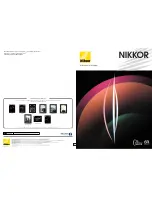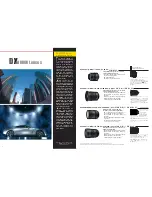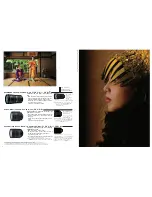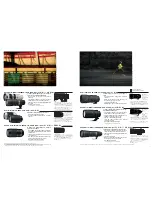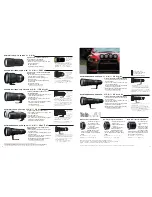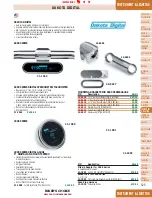
Z
oo
m-
NIKKOR Lenses
12
13
ikon offers over a dozen AF
Zoom-NIKKOR lenses all
of which are outstanding.
The information below will
give you a better idea of
which lenses are most suit-
able for you.
T
he most obvious starting
point when considering a zoom
lens is
focal length
, for that will
determine your range of usage.
Need a great standard zoom
for the wideangle to medium
telephoto range? For greater
wideangle coverage, the
14-
24mm, 17-35mm
and
18-
35mm
are favourites of land-
scape photographers and oth-
ers who need to shoot expan-
sive scenes. Then there are the
more powerful lenses like the
70-300mm
or
80-400mm
.
These are ideal for sports and
action photography, and for
taking shots of people from a
distance. And for truly high-
power zoom needs, the
24-
120mm
lens offers 5x ratio. Not
only is this lens versatile, this is
compact as well.
T
he
speed
, or maximum
aperture that a lens offers is
another crucial factor. There are
several AF Zoom-NIKKOR
lenses in the wide, medium
and powerful telephoto range
with a fast f/2.8 that are sure to
fit your demands. The
AF-S 14-
24mm, AF-S 17-35mm, AF-S
24-70mm, AF-S 28-70mm
and AF-S VR 70-200mm
are
all perfectly suited for hand-
held shooting in dim light.
M
acro focusing
is another
feature that most AF Zoom-
NIKKOR lenses offer. Those
lenses with the highest
reproduction ratios are the
24-85mm f/2.8-4D IF
(1/2),
and the
VR
70-200mm
f/2.8G IF-ED
(1/3.7).
N
Ultra-wideangle, high-speed zoom lens
with SWM
• Fast f/2.8 aperture at 14mm focal length
• PGM aspherical lenses and ED glass ele-
ments
• Nano Crystal Coat reduces ghosting and
flare
• Compact SWM for accurate, ultra-quiet AF
• Nine-blade rounded diaphragm
Lens construction:
14 elements in 11 groups
Closest focusing:
0.28m/0.9 ft. (at 18-
24mm focal length)
Picture angle with Nikon
DX format:
35mm (135) format equivalent to
21-36mm
Hood:
Built-in
Dimensions:
98 x
131.5mm
Weight:
970g
Portable ultra-wideangle zoom lens
• Aspherical lenses and ED glass elements
• Focuses down to 0.33m/1.1 ft.
• IF (Internal Focusing) technology
• Seven-blade rounded diaphragm
Lens construction:
11 elements in 8 groups
Closest focusing:
0.33m/1.1 ft.
Picture
angle with Nikon DX format:
35mm (135)
format equivalent to 27-52.5mm
Filter
attachment size:
77mm
Hood:
HB-23
(provided)
Dimensions:
82.5 x 82.5mm
Weight:
370g
AF Zoom-Nikkor 18-35mm f/3.5-4.5D IF-ED (1.9x)
e a i d s
: Nano Crystal Coat
: ED glass elements
: Aspherical lens elements
AF-S NIKKOR 14-24mm f/2.8G ED* (1.7x)
e a i d
S
M s
A high-performance, ultra-wideangle
zoom lens with SWM
• Aspherical lenses and ED glass elements
• 0.28m/0.9 ft. closest focusing throughout
zoom range
• M/A mode for quick switching between
autofocus and manual focus operation
• Nine-blade rounded diaphragm
Lens construction:
13 elements in 10 groups
Closest focusing:
0.28m/0.9 ft.
Picture
angle with Nikon DX format:
35mm (135)
format equivalent to 25.5-52.5mm
Filter
attachment size:
77mm
Hood:
HB-23 (pro-
vided)
Dimensions:
82.5 x 106mm
Weight:
745g
AF-S Zoom-Nikkor 17-35mm f/2.8D IF-ED (2.1x)
e a i d
S
M s
AF-S NIKKOER 24-70mm f/2.8G ED © Mattias Klum
AF Zoom-Nikkor 18-35mm f/3.5-4.5D IF-ED © Steven Y
ee Pui Chung
AF Zoom-NIKKOR lenses—
distinguishing features
*
The G-type NIKKOR has no aperture ring; aperture should be selected from camera body.
G-type NIKKOR is compatible with all exposure modes of the Nikon F6, F5, F100, F80, F75, F65, F60, F55, F50,
F-401 series, PRONEA 600i, PRONEA S, D3, D2 series, D1 series, D300, D200, D100, D80, D70S/D70, D60, D50 and
D40X/D40, and the [P] and [S] modes of the F4, F90 series, F70, F-801 series and F-601M. Other cameras are not compatible.

